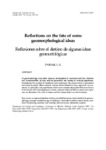Mostrar o rexistro simple do ítem
Reflections on the fate of some geomorphological ideas
| dc.contributor.author | Twidale, C. R. | |
| dc.date.accessioned | 2010-01-25T09:38:27Z | |
| dc.date.available | 2010-01-25T09:38:27Z | |
| dc.date.issued | 2001 | |
| dc.identifier.citation | Cadernos do Laboratorio Xeolóxico de Laxe, 2001, 26: 101-120 ISSN: 00213-4497 | es_ES |
| dc.identifier.issn | 0213-4497 | |
| dc.identifier.uri | http://hdl.handle.net/2183/6513 | |
| dc.description.abstract | [Abstract] In geomorphology, as in other sciences, investigation is concerned with the collection and characterisation of data, and the generation and testing of working hypotheses. Considering the analysis of landforms and landscapes, the reasons some explanations have been accepted, others rejected, and yet others refuted but later approved, are examined. In particular, why hypotheses which were considered plausible but were shown to be flawed still received general acclaim, whereas others of obvious merit were ignored, are discussed. The roles of chance and the human factor are also broached. | |
| dc.language.iso | eng | es_ES |
| dc.publisher | Universidade da Coruña | es_ES |
| dc.subject | Acceptance/rejection of ideas | es_ES |
| dc.subject | Plausibility | es_ES |
| dc.subject | Human factor | es_ES |
| dc.subject | Fashion in geomorphology | es_ES |
| dc.subject | Concepts considered | es_ES |
| dc.subject | Age of landscape | es_ES |
| dc.subject | Channeled Scabland | es_ES |
| dc.subject | Desert dunes | es_ES |
| dc.subject | Insolation weathering | es_ES |
| dc.subject | Lunettes | es_ES |
| dc.subject | River velocity | es_ES |
| dc.subject | Sheet structure | es_ES |
| dc.subject | Submarine canyons | es_ES |
| dc.title | Reflections on the fate of some geomorphological ideas | es_ES |
| dc.title.alternative | Reflexiones sobre el destino de algunas ideas geomorfológicas | |
| dc.type | info:eu-repo/semantics/article | es_ES |
| dc.rights.access | info:eu-repo/semantics/openAccess |






